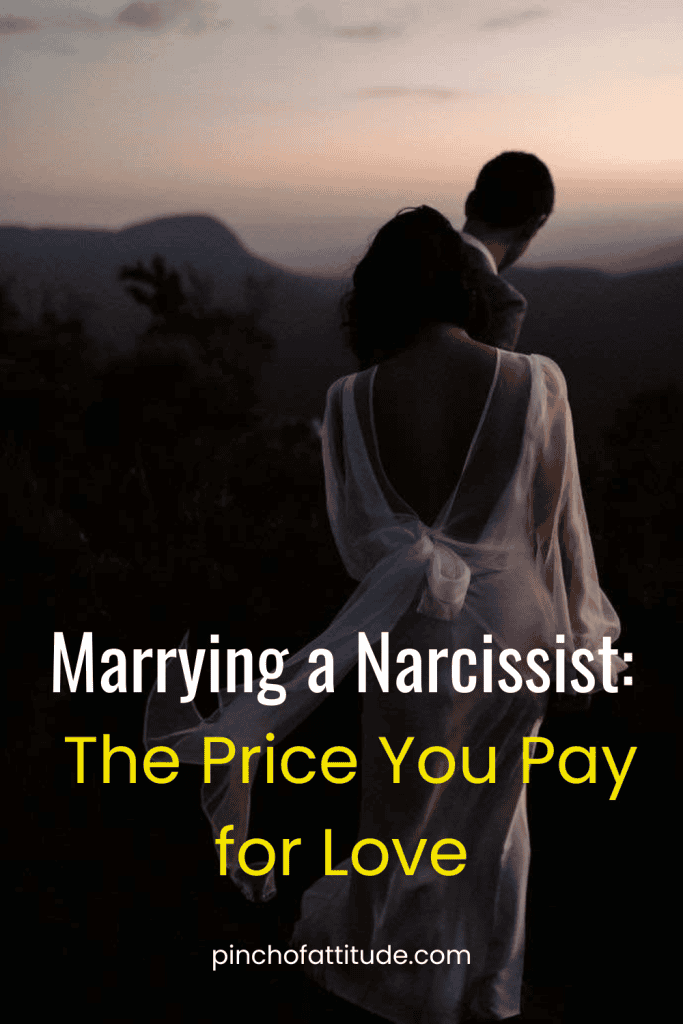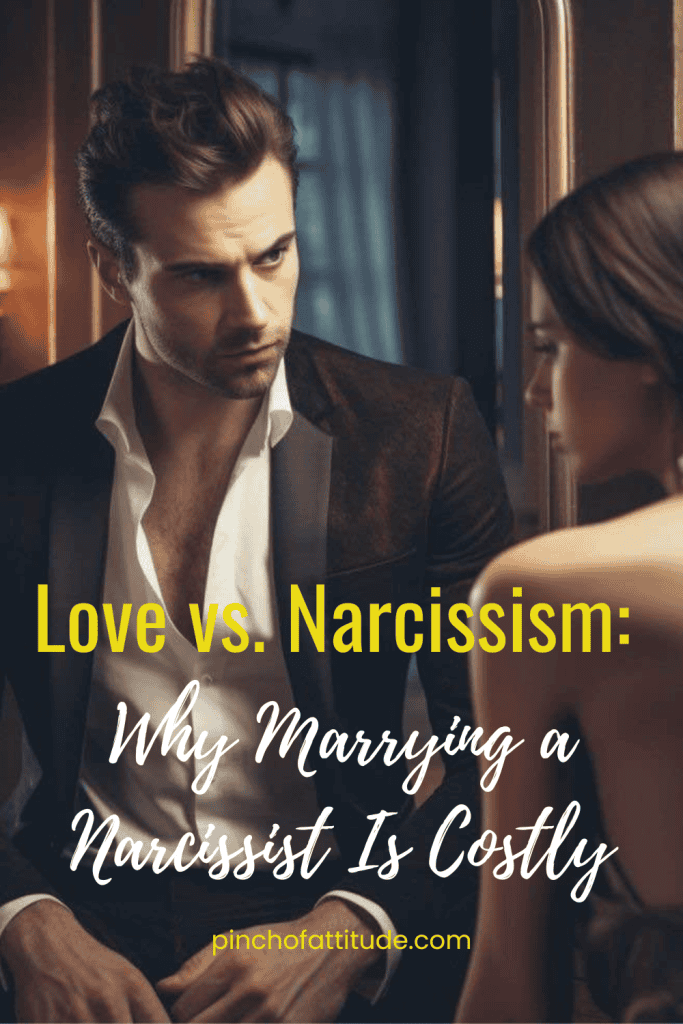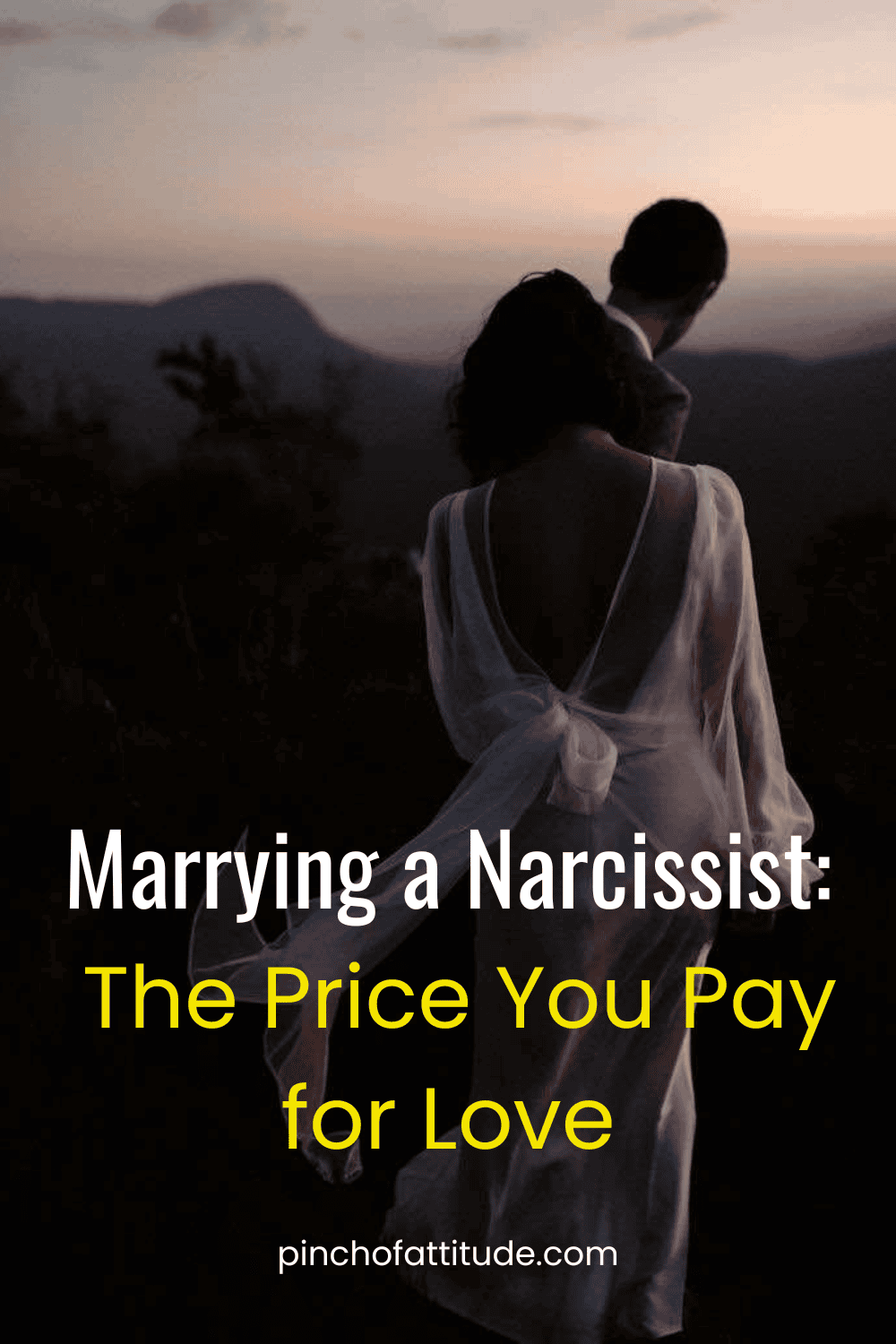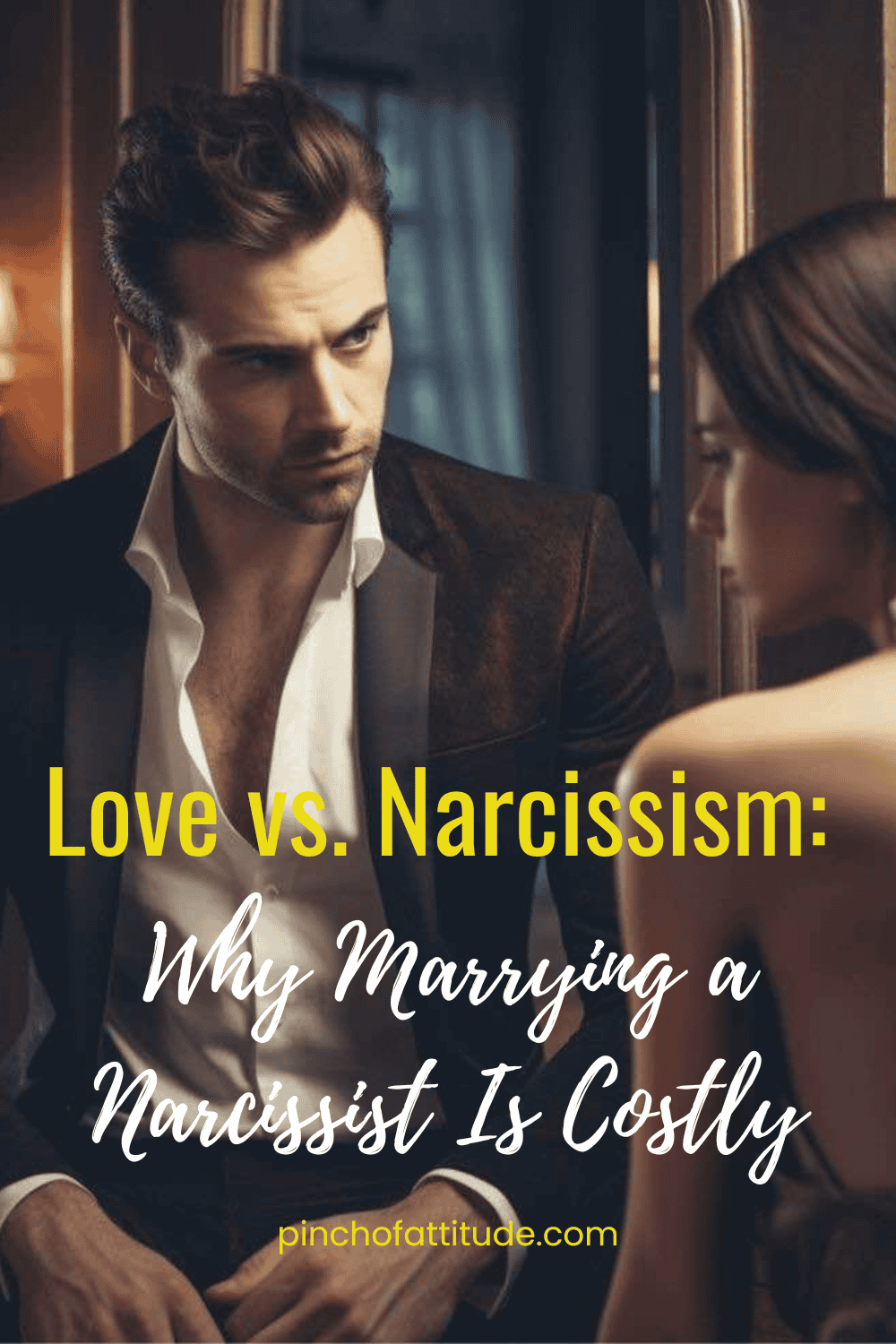My name is Lilly, and I was married to a narcissist for 30 years. My journey began when we began dating when I was just 17 years old, fresh-faced and full of hope.
He was charming, charismatic, and attentive, the perfect gentleman. I was a young, naive girl, full of dreams and aspirations, unaware that my life would turn dark.
I fell in love with a narcissistic man whose love was a meticulously crafted illusion.
The cost of narcissistic abuse is profound, eroding one’s self-esteem, sense of self-worth, and very identity. It’s a price that manifests in anxiety, depression, and a constant feeling of walking on eggshells, and includes the loss of friendships, strained family relationships, and missed opportunities. It brings about chronic stress, health issues, and a warped sense of reality, resulting in doubts about one’s sanity, perceptions, and value.
Table of Contents
Narcissism in Marriage

Narcissism, a trait marked by an inflated sense of self-importance, a deep need for excessive attention and admiration, coupled with a lack of empathy for others, can become particularly toxic within the sanctity of marriage.
My ex-husband’s narcissistic abuse was subtle and insidious. It began with small criticisms, dressed up as jokes, that slowly eroded my self-esteem. I was always “too sensitive,” “too emotional,” or simply “too stupid” because, after all, I am just a woman.
Then came the gaslighting, where he would twist reality to fit his narrative, making me doubt my memory and judgment. He was always right. I was always wrong.
We moved to a new state where he isolated me from friends and family, making me feel alone and dependent on him. He used guilt and manipulation to control my actions and emotions, leaving me feeling helpless and trapped.
As the years passed, I lost sight of who I was. I became a shadow of my former self. The vibrant, confident woman I once was had been replaced by a timid, anxious shell, constantly seeking validation from the man who was tearing me down.
The broad range of costs associated with marrying a narcissist extends far beyond the emotional distress. Psychological repercussions, financial exploitation, and many other impacts can erode one’s sense of self, financial security, and overall well-being.
These costs are not just limited to the narcissistic partner’s direct actions but are also found in the subtle ways they manipulate, control, and erode the foundation of trust and mutual respect that marriage is built on.
What Are The Costs?
Emotional Abuse
In a marriage where one partner is a narcissist, the emotional environment is often filled with manipulation and abuse, creating a challenging situation for the other partner characterized by confusion, pain, and loneliness.
Narcissists frequently use emotional manipulation as a means to assert control and superiority, employing tactics like projecting and gaslighting—denying their own harmful actions or blaming their partner—thereby instilling intense feelings of unreality and self-doubt in their spouse. Partners may find themselves constantly criticized, their achievements belittled, and their concerns dismissed, fostering an environment of worthlessness and isolation.
Loneliness
Compounding this emotional toll is the profound loneliness stemming from a lack of genuine connection. Narcissists, inherently self-centered and lacking empathy, are unable to form deep, meaningful relationships. Their partners often feel more like accessories than loved ones, valued only for how they bolster the narcissist’s ego.
This emotional unavailability creates a void where intimacy and mutual support should reside, leaving their partners feeling unseen, unheard, and fundamentally alone even within the confines of marriage.
Psychological Results
The psychological impact of being married to a narcissist can manifest in a myriad of mental health struggles that can profoundly alter one’s sense of well-being. The constant emotional turbulence, manipulation, and criticism inherent in such relationships can lead to:
- Chronic anxiety
- Depression
- Post-Traumatic Stress Disorder (PTSD)
Anxiety often stems from the unpredictability of the narcissist’s moods and the relentless need to tread carefully to avoid conflict.
Depression can follow prolonged exposure to a relationship where one’s needs are perpetually sidelined, and one’s achievements and desires are minimized or ignored entirely.
In more severe cases, the trauma from sustained emotional abuse and manipulation can result in PTSD, marked by flashbacks, severe anxiety, and uncontrollable thoughts about the ordeal.
Loss of Self-Identity
Central to the psychological impact is the profound loss of self that partners experience. Over time, the narcissist’s criticisms and manipulative tactics can erode their partner’s sense of identity and self-worth. Partners may begin to question their perceptions, beliefs, and even their sanity, due to the narcissist’s gaslighting.
This loss of self is not merely a byproduct of the relationship but a direct consequence of being systematically devalued and invalidated. The person who once entered the relationship with a strong sense of identity might find themselves unsure of their likes, dislikes, and even their core values, having submerged these to appease the narcissist.
Financial Exploitation
The financial ramifications of being entangled with a narcissist in marriage are often as significant as the emotional and psychological tolls. Narcissists may seek to financially exploit or dominate their partners as another means of exerting control and maintaining dependency.
This exploitation can manifest in various ways, from controlling the household finances and making unilateral decisions about expenditures to manipulating their partner into financial decisions that undermine their stability and autonomy. In some cases, the narcissist may rack up debts in their partner’s name or deplete shared assets for personal gain, leaving their spouse financially vulnerable.
Social Isolation
Narcissists often employ isolation as a tactic to further control and manipulate their partners, cutting them off from their support networks of friends and family. This isolation not only reinforces the partner’s dependency on the narcissist but also erodes their social connections, making it more challenging to seek help or escape the relationship. The loss of these connections can have profound emotional repercussions, exacerbating feelings of loneliness and helplessness.
Career Impacts
The negative impacts of a relationship with a narcissist can extend into the professional realm as well. The emotional and psychological toll can affect job performance, motivation, and overall career trajectory. Absenteeism may increase due to stress or legal obligations related to divorce proceedings, and the narcissist’s behavior might even invade the workplace, further undermining the partner’s professional standing and achievements.
Totally Lost Turned Into Discovery
Narcissism in my marriage cost me more than I could have imagined. I got to the point where I hardly recognized myself anymore. My hopes and dreams were squashed, my feelings dismissed, and my sense of worth shattered. I suffered from depression, anxiety, PTSD, and an autoimmune disorder. My finances were a complete mess.
But deep down, a flicker of my old self remained. A spark of resilience that refused to be extinguished. It was this spark that finally pushed me to seek help.
I started therapy, where I learned about narcissistic abuse and its effects. My therapist helped me understand the nature of narcissistic abuse and its impact on my mental health. She helped me realize that his behavior was not a reflection of my worth but rather a reflection of his own insecurities.
I realized I wasn’t crazy, I wasn’t overreacting; I was a victim of abuse.
The road to recovery is long and arduous. It involves peeling back layers of trauma, unlearning harmful beliefs, setting boundaries, asserting my needs, and learning to trust myself again. It involves grieving the loss of the relationship I thought I had and the man I thought he was. And more than anything, it begins with self-love.
Recovery Can Begin!

Let’s look at how to begin the recovery process from emotional abuse.
1. Label It!
The path to eventually overcoming this emotional toll begins with recognizing the signs of emotional abuse and identifying patterns of manipulation, gaslighting, and the cyclical nature of the narcissist’s behavior. Acknowledging these realities does not imply immediate escape or confrontation, especially when safety and emotional well-being are at risk, but it does lay the groundwork for seeking support. You can’t escape what you don’t know is dangerous.
2. Get Emotional Support
Seeking emotional support and counseling is crucial. Reestablishing old friendships, reaching out to family members, and engaging in community or group activities can help rebuild these vital support systems. Professional counseling can offer a safe space to process the complexities of the relationship, understand the dynamics at play, and begin the journey of healing.
Support groups, either in-person or online, can provide solace and validation from those who have experienced similar situations. These communities foster a sense of belonging and understanding, which is crucial for those who have felt isolated and misunderstood.
3. Boost Your Mental Strength
Furthermore, strategies such as setting boundaries, practicing self-care, and gradually building a support network outside of the relationship are vital. These steps not only help in mitigating the impact of emotional abuse but also in fostering a sense of self-worth and independence. It’s a journey that requires patience, self-compassion, and sometimes professional guidance, but it’s a journey towards reclaiming one’s life from the shadows of narcissistic abuse.
4. Gain Financial Independence
Securing and rebuilding financial independence in the aftermath of such a relationship is crucial. This process begins with gaining a clear understanding of one’s financial situation, including assets, debts, and income.
Establishing a budget that prioritizes essential expenses and savings can help in regaining financial footing. Opening separate bank accounts, securing credit in one’s own name, and, if necessary, seeking financial advice or support from professionals are important steps towards independence.
My Pathway to Recovery
My pathway to recovery has not been a straight line. In fact, it looks more like rollercoaster tracks with ups and downs, tight turns, and scary plunges into dark tunnels. But it’s important to remember that I continue on my journey, even when I sometimes feel lost and afraid; I continue on. Here are some of the highlights of my pathway.
Finding “The One”
Finding professional help is daunting. But if anything is unquestionable, it’s the importance of getting a proper therapist.
I worked my way through several therapists until I found the right fit. That happens a lot – don’t be discouraged if it happens to you. I needed to find the right person to make me feel safe, heard, and accepted.
My therapist laughs with me when we remember when we first met. I was this insecure, scared little being. But I opened our first session, informing her that I was getting a divorce and that if she couldn’t support me in my decision, then we were not going to be a good match. This is an incredibly bold statement from a people-pleaser such as myself, but it showed I was determined to surround myself with the right tribe.
Self-Care
Self-care became an essential part of my healing journey. It was about more than just bubble baths and yoga classes; it was about prioritizing my mental, emotional, and physical well-being. It was about learning to say no, to put myself first, to nurture my spirit. It was about rediscovering who I was, who I wanted to be, and what I deserved.
Self-care will look different for each person. Yoga is a close companion of mine. I take regular walks and frequent visits to local gardens. I began working on jigsaw puzzles; I found the task relaxing and hypnotic.
The main takeaway is that I do things that I enjoy. These are things that bring me joy.
Rebuilding Me
Rebuilding one’s identity is perhaps the most challenging yet rewarding part of recovery. It involves rediscovering personal interests, values, and goals outside of the relationship’s influence.
This process can be facilitated through therapy, journaling, reconnecting with old friends and interests, and exploring new passions. As individuals reclaim their identity and self-worth, they lay the foundation for a healthier future, free from the shadows of narcissistic abuse.
The Undimmable Light
Overcoming narcissistic abuse is a testament to the human spirit’s resilience. It’s about finding the strength to break free from the chains of abuse, to reclaim your identity, and to rebuild your life. It’s about learning to trust yourself again, to love yourself again, to believe in yourself again.
My journey is not unique. Millions of people worldwide are victims of narcissistic abuse. But like me, they too can find the strength to break free, to heal, to thrive.
It’s a difficult journey, but it’s a journey worth taking. Because on the other side of the darkness, there’s a light. A light of self-love, self-respect, and self-worth. A light that no narcissist can ever dim.
Support and Resources
For those dealing with or recovering from relationships with narcissists, finding the right support is crucial to the healing process. Here is a list of resources, including hotlines, counseling services, and support groups, that can assist:
- National Domestic Violence Hotline:
- Website: thehotline.org
- Hotline: 1-800-799-SAFE (7233)
- Offers 24/7 support for individuals experiencing or recovering from domestic violence, including those in relationships with narcissists.
- The Samaritans:
- Website: samaritans.org
- Hotline: 116 123 (UK and Ireland)
- Provides confidential listening services for those in distress.
- Mental Health America (MHA):
- Website: mhanational.org
- Offers resources and support for those dealing with mental health issues stemming from abusive relationships.
- CoDA (Codependents Anonymous):
- Website: coda.org
- A fellowship of men and women whose common purpose is to develop healthy relationships.
- Narcissistic Abuse Recovery Support Groups:
- Website: meetup.com
- Search for local or online support groups specifically for those recovering from narcissistic abuse.
- BetterHelp:
- Website: betterhelp.com
- Offers online counseling and therapy services with licensed therapists who can provide support for those recovering from relationships with narcissists.
- Talkspace:
- Website: talkspace.com
- Another platform for online therapy with professionals experienced in dealing with the aftermath of abusive relationships.
- RAINN (Rape, Abuse & Incest National Network):
- Website: rainn.org
- Hotline: 800-656-HOPE (4673)
- Offers support for victims of abuse, including those escaping narcissistic relationships.




Nice article. It reflects my experience completely, 35 years of trying you make it work. I’m out now and doing great. Rebuilding and healing is brutally hard work, but unlike the preceeding years, it is filled with hope, growing stronger as the years pass.